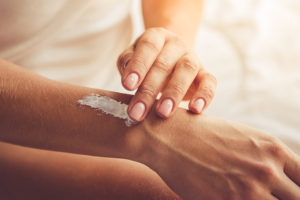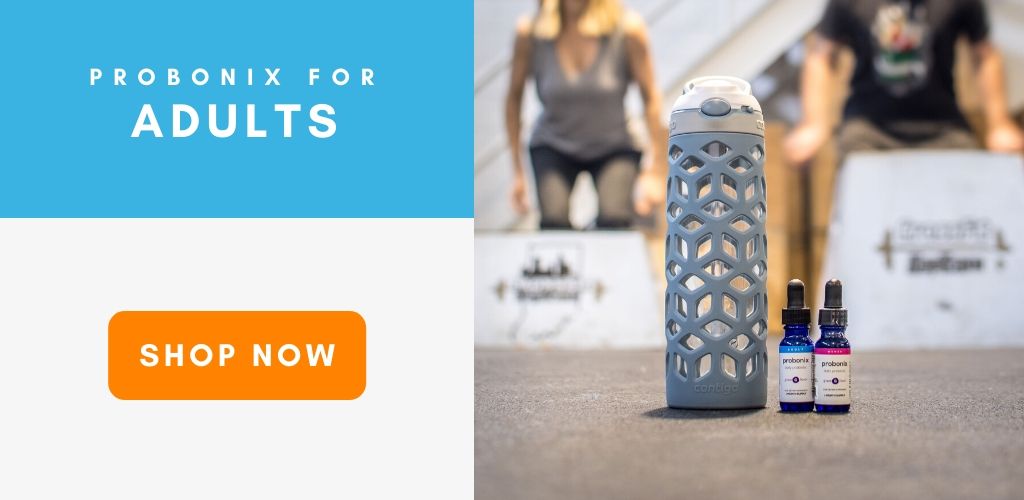 It seems like probiotics are everywhere nowadays. Take a stroll through the grocery store, and you’ll see them advertised in milks, juices, and pickles, in addition to the usual suspects of yogurt and kefir. The oral probiotic supplement market is booming, and skin care seems to be close behind. A quick Google search for “probiotics skin care” will give you hundreds of results for skin care products infused with probiotics. So what gives? Why have these microorganisms gained so much popularity within the skin care market in the span of only a few years? Can they really lead to healthy skin?
It seems like probiotics are everywhere nowadays. Take a stroll through the grocery store, and you’ll see them advertised in milks, juices, and pickles, in addition to the usual suspects of yogurt and kefir. The oral probiotic supplement market is booming, and skin care seems to be close behind. A quick Google search for “probiotics skin care” will give you hundreds of results for skin care products infused with probiotics. So what gives? Why have these microorganisms gained so much popularity within the skin care market in the span of only a few years? Can they really lead to healthy skin?
There are a couple factors at play here. The obvious answer is that probiotics are hip right now, so incorporating them into any product can score you major marketing points. Probiotics are good for you, so probiotics in skin care products makes them good for you. Right? It’s an easy narrative for marketers to push and an easier one for consumers to latch on to. It makes sense.
The better answer is that there has been a substantial amount of research performed over the last several years demonstrating that probiotics have beneficial effects on skin health. From eczema and dermatitis to wrinkle protection and skin hydration, probiotics have been shown to have positive effects on a variety of skin conditions and overall skin health.
Common Skin Conditions
Most people know that probiotics can help with things like constipation and gas, but did you know that probiotics have also been shown to benefit individuals with eczema and atopic dermatitis, as well as a variety of other skin conditions like psoriasis,1 acne,2 and even rosacea?3 Strains like B. lactis, L. rhamnosus, and L. reuteri have been shown to have beneficial effects in treating or preventing eczema. In a recent study, eczema symptoms were significantly improved in infants receiving either L. rhamnosus or B. lactis after 2 months.4 Infants from mothers that take L. reuteri supplements during pregnancy are less likely to develop eczema.5 Considering the fact that eczema affects about 10-20% of infants and 3% of adults and children in the U.S., it’s no wonder that the inclusion of probiotics in products targeted at treating eczema is catching on.
Certain probiotic strains have had a similar positive impact on atopic dermatitis. Mothers that supplement with L. rhamnosus significantly lower the risk that their infants will develop atopic dermatitis during their first two years of life. L. salivarius has been shown to improve the symptoms of atopic dermatitis in both children6 and adults.7 For a study directly applicable to skin care application, topical administration of a cream containing S. thermophilus increased ceramide levels and improved the signs and symptoms of atopic dermatitis.8
Probiotics Can Make Healthy Skin Healthier
People with skin conditions aren’t the only ones that should consider the benefits of probiotics for the skin. There are a variety of studies suggesting probiotics can have great benefits for overall skin health. L. plantarum can have a variety of positive effects on the skin, such as providing anti-photoaging effects,9 improving skin barrier function,10 and promoting collagen synthesis.11 The results of this 12-week study involving L. plantarum are particularly noteworthy.12 110 volunteers aged 41 to 59 years old took either a probiotic supplement (L. plantarum) or a placebo every day for 12 weeks. At the end of the study, participants in the probiotic group had increased skin water content in the face and hands, significant reduction in wrinkle depth, significantly improved skin gloss, and increased skin elasticity when compared to the placebo group. That’s a lot of benefits for a single probiotic strain!
As you can see, there are plenty of reasons to include probiotics in skin care products beyond simply riding a hot marketing trend. More research is needed to compare and contrast the effects of topical vs. oral probiotic treatments, but a number of studies on topical applications have already proven the benefits that certain probiotic strains can provide. It seems that the bacteria that keep you healthy on the inside can also help you look and feel better on the outside. No wonder they’re so popular!
1Groeger, D., O’Mahony, L., Murphy, E. F., Bourke, J. F., Dinan, T. G., Kiely, B., Shanahan, F., & Quigley, E. M. (2013). Bifidobacterium infantis 35624 modulates host inflammatory processes beyond the gut. Gut microbes, 4(4), 325–339. https://doi.org/10.4161/gmic.25487
2Kim J, Ko Y, Park YK, Kim NI, Ha WK, Cho Y. Dietary effect of lactoferrin-enriched fermented milk on skin surface lipid and clinical improvement of acne vulgaris. Nutrition. 2010 Sep;26(9):902-9. doi: 10.1016/j.nut.2010.05.011. PMID: 20692602.
3Kober, M. M., & Bowe, W. P. (2015). The effect of probiotics on immune regulation, acne, and photoaging. International journal of women’s dermatology, 1(2), 85–89. https://doi.org/10.1016/j.ijwd.2015.02.001
4Islam S. U. (2016). Clinical Uses of Probiotics. Medicine, 95(5), e2658. https://doi.org/10.1097/MD.0000000000002658
5Abrahamsson, T. R., Jakobsson, T., Böttcher, M. F., Fredrikson, M., Jenmalm, M. C., Björkstén, B., & Oldaeus, G. (2007). Probiotics in prevention of IgE-associated eczema: a double-blind, randomized, placebo-controlled trial. The Journal of allergy and clinical immunology, 119(5), 1174–1180. https://doi.org/10.1016/j.jaci.2007.01.007
6Niccoli, A. A., Artesi, A. L., Candio, F., Ceccarelli, S., Cozzali, R., Ferraro, L., Fiumana, D., Mencacci, M., Morlupo, M., Pazzelli, P., Rossi, L., Toscano, M., & Drago, L. (2014). Preliminary results on clinical effects of probiotic Lactobacillus salivarius LS01 in children affected by atopic dermatitis. Journal of clinical gastroenterology, 48 Suppl 1, S34–S36. https://doi.org/10.1097/MCG.0000000000000233
7Drago, L., Iemoli, E., Rodighiero, V., Nicola, L., De Vecchi, E., & Piconi, S. (2011). Effects of Lactobacillus salivarius LS01 (DSM 22775) treatment on adult atopic dermatitis: a randomized placebo-controlled study. International journal of immunopathology and pharmacology, 24(4), 1037–1048. https://doi.org/10.1177/039463201102400421
8Di Marzio, L., Centi, C., Cinque, B., Masci, S., Giuliani, M., Arcieri, A., Zicari, L., De Simone, C., & Cifone, M. G. (2003). Effect of the lactic acid bacterium Streptococcus thermophilus on stratum corneum ceramide levels and signs and symptoms of atopic dermatitis patients. Experimental dermatology, 12(5), 615–620. https://doi.org/10.1034/j.1600-0625.2003.00051.x
9Jeong, J. H., Lee, C. Y., & Chung, D. K. (2016). Probiotic Lactic Acid Bacteria and Skin Health. Critical reviews in food science and nutrition, 56(14), 2331–2337. https://doi.org/10.1080/10408398.2013.834874
10Kim, H., Kim, H. R., Jeong, B. J., Lee, S. S., Kim, T. R., Jeong, J. H., Lee, M., Lee, S., Lee, J. S., & Chung, D. K. (2015). Effects of oral intake of kimchi-derived Lactobacillus plantarum K8 lysates on skin moisturizing. Journal of microbiology and biotechnology, 25(1), 74–80. https://doi.org/10.4014/jmb.1407.07078
11Hong, Y. F., Lee, H. y., Jung, B. J., Jang, S., Chung, D. K., & Kim, H. (2015). Lipoteichoic acid isolated from Lactobacillus plantarum down-regulates UV-induced MMP-1 expression and up-regulates type I procollagen through the inhibition of reactive oxygen species generation. Molecular immunology, 67(2 Pt B), 248–255. https://doi.org/10.1016/j.molimm.2015.05.019
12Lee, D. E., Huh, C. S., Ra, J., Choi, I. D., Jeong, J. W., Kim, S. H., Ryu, J. H., Seo, Y. K., Koh, J. S., Lee, J. H., Sim, J. H., & Ahn, Y. T. (2015). Clinical Evidence of Effects of Lactobacillus plantarum HY7714 on Skin Aging: A Randomized, Double Blind, Placebo-Controlled Study. Journal of microbiology and biotechnology, 25(12), 2160–2168. https://doi.org/10.4014/jmb.1509.09021
People who liked this blog also read these:


